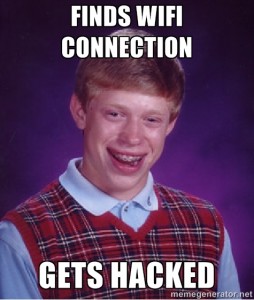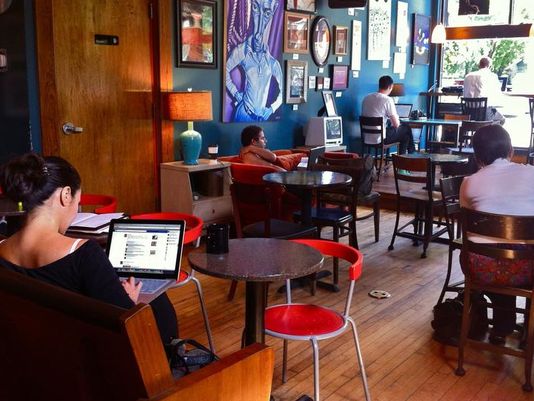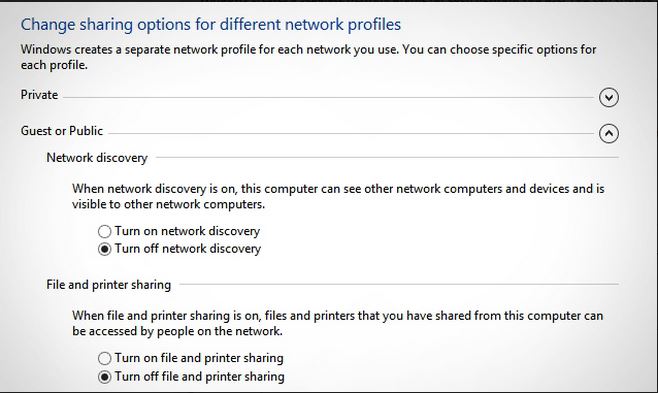Internet steals our souls. Getting stuck anywhere without an internet connection is probably the most painful form of torture nowadays. Until a few years ago, internet was a fixture in the average household, but today it is everywhere! Everything now runs off the internet pipeline. It has become our non-real, real world. Public wifi hotspots have become increasingly popular, more common and practically a routine to us wherever we go. They are a blessing to travellers who are trying to avoid international roaming charges, or web surfers who are looking for their daily internet fix in coffee shops, restaurants, clubs, reading rooms, hotels, libraries, schools; basically everywhere. Public wifi hotspots are usually free and that’s why they’re so popular as they provide us with an alternative internet connection so as not to exceed our mobile data packet limits or get toasted with overage fees. The exponential growth of public wifi walks hand in hand with the pervasiveness of smart portable devices, such as: smartphones, iPads and tablets.
Should I really worry about security when I use public wifi?
 Unless you want to be like bad Brian, you should definitely be concerned about your privacy and safety whenever you’re surfing the web on public wifi networks. Despite the mounting bloom of public wifi hotspots, not all public wifi hotspots can provide you with protection over the internet. Even if secured with a password, sharing an internet network with strangers can compromise your online privacy and make you vulnerable to cyber threats. If you aren’t too careful, hackers and phishers can snoop into your emails, social conversations, steal your personal data and credit card information. In addition, they can spread out malware to your device.
Unless you want to be like bad Brian, you should definitely be concerned about your privacy and safety whenever you’re surfing the web on public wifi networks. Despite the mounting bloom of public wifi hotspots, not all public wifi hotspots can provide you with protection over the internet. Even if secured with a password, sharing an internet network with strangers can compromise your online privacy and make you vulnerable to cyber threats. If you aren’t too careful, hackers and phishers can snoop into your emails, social conversations, steal your personal data and credit card information. In addition, they can spread out malware to your device.
You have no idea how notoriously easy it has become for hackers and identity thieves to steal usernames and passwords through public wifi networks because even though most wireless routers come with a firewall to protect you on the internet, it can’t protect you from other users sharing the same network.
5 Security Tips to Stay Safe on Public Wifi Networks
So is it possible to protect yourself and secure your sensitive data, or even carry out financial transactions when you are connected to a public wifi? Yes, it’s possible to keep away from the bad guys as long as you follow these essential security tips whenever you’re using a public wifi network.
1) Turn Off Sharing Settings
If you’re using your laptop outdoors, say in a cafe, make sure to turn off network sharing settings when you’re connected to a public wifi, as shown in the figure below. In addition, prevent remote access/login from other computers.
If you’re using Windows, then go to your Control Panel > Network and Internet > Network and Sharing Center, then click on Choose Change Advanced Sharing Settings. Afterwards, turn off file and printer sharing, and also turn off network discovery as well as public folder sharing.
If you’re using OX S, then go to System Preferences > Sharing and uncheck all the boxes. After that, turn off network discovery so that you won’t been seen by other users. You can do that by going to your firewall’s advanced settings and click on stealth mode.
2) Never Connect Automatically to Wifi Hotspots
As much as it’s an easy, irresistible feature in smartphones, laptops and tablets, connecting automatically to public wifi networks is a trojan horse. This demonic setting can seriously harm your device and compromise your security and personal data. Because, for instance “hackers often give their rogue hotspots generic names such as Coffee Shop, Linksys or AT&T Wireless. You want to be certain you are connecting to the router of the business.” In addition, your phone or tablet won’t ask for your permission to connect to a network which may be a malicious wifi network that will spread malware and viruses all over your machine.
Therefore, make sue to disable this setting on your hand device or laptop before connecting to a public wifi hotspot, even if that network is secured with a password. It won’t save you from cyber criminals sharing the same network.
3) Enable Your Firewall
Almost all operating systems include integrated firewall systems to monitor and filter incoming and outgoing connections. Although your firewall might not give you optimal protection, it should be enabled, nevertheless.
If you’re a Windows user, you can find your firewall settings by heading over to Control Panel> System And Security, then click on Windows Firewall and click Turn Windows Firewall On or Off. Afterwards, insert your administrator password, then confirm that the Firewall is on.
For Mac users, go to System Preferences > Security & Privacy, then move to the Firewall tab and click on “Turn On Firewall“.
4) Verify the Network Name
You shouldn’t be fooled by obvious public wifi names when you’re in a coffee shop or any place. Hackers and scammers usually setup fake public wifi hotspots to lure gullible surfers. For example, if you’re at a Starbucks, the public wifi will unlikely be called “Free Starbucks Wi-Fi”. By connecting to a fake wifi hotspot, you put your device and sensitive information into jeopardy.
Instead, if you’re at a cafe, a restaurant, a lounge or a coffee shop, ask the employee for the name and password of their public wifi network.
5) Use a VPN
By far the safest and most efficient way to protect your privacy and personal data over the internet is by using a Virtual Private Network (VPN). VPNs are encryption tools used by millions of internet users nowadays to secure their internet connection and become anonymous online. A VPN cloaks your real IP address and replaces it with another one from a different location. Moreover, VPN secures your personal data through an encrypted tunnel within the internet before reaching the target website. In this way, you will not only be able enjoy full data protection and privacy when you are online, but also to bypass geo-restrictions and gain access to blocked websites in your country. What’smore, VPNs boost your internet connection, giving you a buffer-free streaming experience when you watch Arrow outside USA. A lot of VPN services offer more than one subscription plan to meet everyone’s needs. Check out our reviews on some of the best and cheapest VPN services in the market, based on a 3-month evaluation for each service.






One thought on “5 Security Steps to Stay Safe On Public WiFi Networks”
When using public WiFi at hotel and a vpn, are both connections suppose to be set to public, or set vpn to private? It’s Avast secureline free subscription, can’t afford to pay a premium vpn service now. Also, should I use the built in firewall form Avast or my Windows firewall? The Avast tech advised me to set both connections to private, which doesn’t sound right since I’m in a hotel where everyone shares this connection? Please help, I’m here for a duration of time and have to do many things from here that I need to be sure as possible for banking,and work from home, etc.